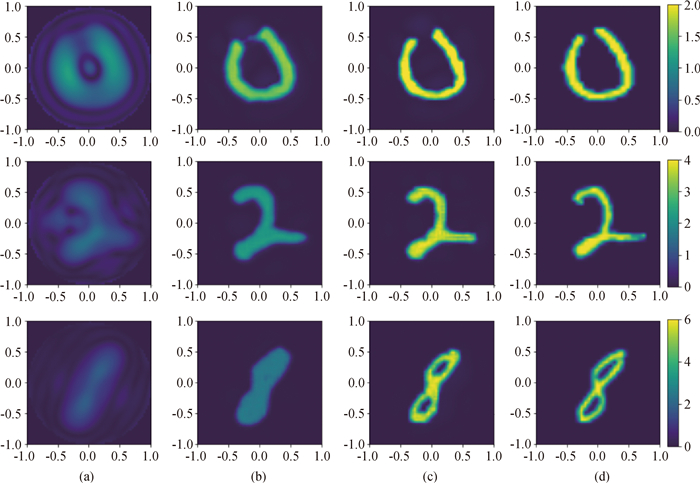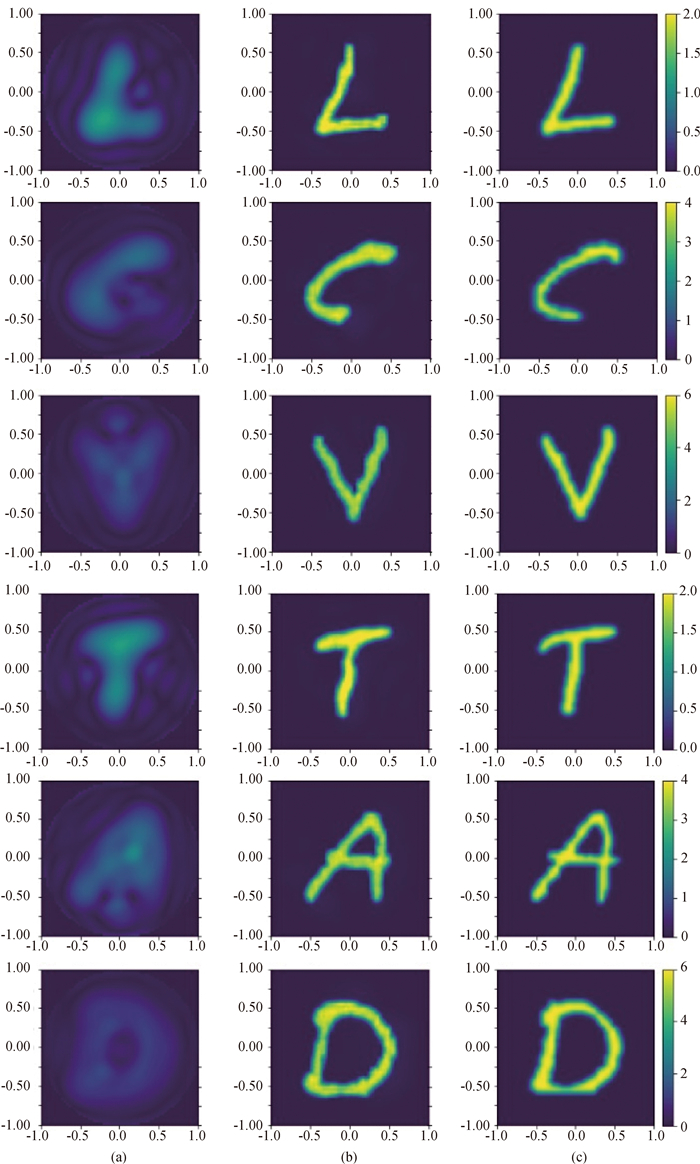计算物理 ›› 2024, Vol. 41 ›› Issue (6): 717-731.DOI: 10.19596/j.cnki.1001-246x.8992
收稿日期:2024-07-22
出版日期:2024-11-25
发布日期:2024-12-26
通讯作者:
张波
作者简介:李凯, 博士, 博士后, 研究方向为深度学习与AI、反问题与成像, E-mail: likai98@amss.ac.cn
基金资助:Received:2024-07-22
Online:2024-11-25
Published:2024-12-26
Contact:
Bo ZHANG
摘要:
反问题在雷达和声呐探测、医学成像、无损探伤、地球物理勘探等许多领域具有广泛而重要的应用。然而在大多数情况下, 反问题是一个病态的不适定问题, 构造其稳定高效的反演算法极具挑战性。利用未知解的先验信息来构建恰当的正则化策略是应对上述挑战的重要方法之一。传统正则化方法的成功依赖于将未知解准确的先验信息显式地编码到反演算法当中, 但在实际计算中这往往是难以获取和实现的。随着近年来深度学习技术的发展, 直接从数据中学习未知解的先验信息成为了可能, 这将有助于发展高效稳定的反演算法。本文回顾了基于深度学习反演算法的一些最新进展, 重点介绍基于可学习正则化框架的反演算法。此外, 还总结了基于深度学习反演算法的优缺点, 并展望其未来的发展方向。
李凯, 张波. 基于深度学习的反演算法: 某些最新进展[J]. 计算物理, 2024, 41(6): 717-731.
Kai LI, Bo ZHANG. Inversion Algorithms Based on Deep Learning for Inverse Problems: Some Recent Progresses[J]. Chinese Journal of Computational Physics, 2024, 41(6): 717-731.

图4 可学习投影迭代算法的重构结果(第3列) (a)Landweber; (b) simplified learned projected scheme; (c) learned projected scheme; (d) ground truth
Fig.4 Reconstructed results by learned projected iterative algorithm (3rd column) (a)Landweber; (b) simplified learned projected scheme; (c) learned projected scheme; (d) ground truth

图5 可学习投影迭代算法的泛化性能(a)Landweber; (b)learned projected algorithm; (c) ground truth
Fig.5 Generalization ability of learned projected iterative algorithm (a)Landweber; (b)learned projected algorithm; (c) ground truth
| 1 |
|
| 2 |
|
| 3 |
|
| 4 |
DOI |
| 5 |
DOI |
| 6 |
DOI |
| 7 |
|
| 8 |
|
| 9 |
|
| 10 |
|
| 11 |
DOI |
| 12 |
|
| 13 |
|
| 14 |
DOI |
| 15 |
DOI |
| 16 |
|
| 17 |
DOI |
| 18 |
|
| 19 |
DOI |
| 20 |
DOI |
| 21 |
DOI |
| 22 |
DOI |
| 23 |
DOI |
| 24 |
DOI |
| 25 |
DOI |
| 26 |
DOI |
| 27 |
DOI |
| 28 |
DOI |
| 29 |
DOI |
| 30 |
|
| 31 |
DOI |
| 32 |
DOI |
| 33 |
DOI |
| 34 |
DOI |
| 35 |
DOI |
| 36 |
DOI |
| 37 |
DOI |
| 38 |
LUNZ S, ÖKTEM O, SCHÖNLIEB C B. Adversarial regularizers in inverse problems[C]//Proceedings of the 32nd International Conference on Neural Information Processing Systems. Montréal, Canada: Curran Associates Inc., 2018: 8516-8525.
|
| 39 |
YANG Yan, SUN Jian, LI Huibin, et al. Deep ADMM-Net for compressive sensing MRI[C]//Proceedings of the 30th International Conference on Neural Information Processing Systems. Barcelona, Spain: Curran Associates Inc., 2016: 10-18.
|
| 40 |
DOI |
| 41 |
DOI |
| 42 |
DOI |
| 43 |
DOI |
| 44 |
DOI |
| 45 |
DOI |
| 46 |
DOI |
| 47 |
DOI |
| 48 |
DOI |
| 49 |
|
| 50 |
DOI |
| 51 |
DOI |
| 52 |
DOI |
| 53 |
JIN Peng, ZHANG Xitong, CHEN Yinpeng, et al. Unsupervised learning of full-waveform inversion: Connecting CNN and partial differential equation in a loop[DB/OL]. arXiv, 2022: 07584(2022-03-18). https://arxiv.org/abs/2110.07584.
|
| 54 |
DOI |
| 55 |
DOI |
| 56 |
LUNZ S. Learned regularizers for inverse problems[M]//CHEN Ke, SCHINLIEB C B, TAI Xuecheng, et al. Handbook of Mathematical Models and Algorithms in Computer Vision and Imaging, Cham: Springer, 2022: 1-21.
|
| 57 |
HALTMEIER M, NGUYEN L. Regularization of inverse problems by neural networks[M]. CHEN Ke, SCHINLIEB C B, TAI Xuecheng, et al. Handbook of Mathematical Models and Algorithms in Computer Vision and Imaging, Cham: Springer, 2022: 1-29.
|
| 58 |
DOI |
| 59 |
DOI |
| 60 |
DOI |
| 61 |
XU R, ZHANG B. NPDHG-CSNets: A deep learning approach for compressive sensing MRI: 报告编号缺失[R]: Preprint, 2024.
|
| 62 |
许锐航. 基于可学习正则化框架的磁共振图像重构算法研究[D]. 北京: 中国科学院大学, 2023.
|
| 63 |
DOI |
| 64 |
DOI |
| 65 |
|
| 66 |
|
| 67 |
|
| 68 |
DOI |
| 69 |
DOI |
| 70 |
|
| 71 |
|
| 72 |
|
| 73 |
|
| 74 |
|
| 75 |
|
| 76 |
|
| 77 |
|
| 78 |
|
| 79 |
|
| 80 |
|
| 81 |
|
| 82 |
NEYSHABUR B, LI Z, BHOJANAPALLI S, et al. Towards understanding the role of over-parametrization in generalization of neural networks[DB/OL]. arXiv, 2018(2018-05-30). https://arxiv.org/pdf/1805.12076.
|
| 83 |
|
| 84 |
CHEN D, TACHELLA J, DAVIES M E. Robust equivariant imaging: A fully unsupervised framework for learning to image from noisy and partial measurements[C]//2022 IEEE/CVF Conference on Computer Vision and Pattern Recognition (CVPR). New Orleans, LA, USA: IEEE, 2022: 5637-5646.
|
| 85 |
|
| 86 |
FARAHANI A, VOGHOEI S, RASHEED K, et al. A brief review of domain adaptation[C]//Advances in Data Science and Information Engineering: Proceedings From ICDATA 2020 and IKE. Las Vegas, USA: ICDATA, 2021: 877-894.
|
| [1] | 刘东, 陈奇隆, 王雪强. 线性积分方程原函数变换深度学习求解方法[J]. 计算物理, 2024, 41(5): 651-662. |
| [2] | 吴国正, 王发杰, 程隋福, 张成鑫. 基于物理信息神经网络的内部声场正反问题数值计算[J]. 计算物理, 2022, 39(6): 687-698. |
| [3] | 卢英东, 韦笃取. 基于遗传注意力机制的DLSTM电力系统混沌预测[J]. 计算物理, 2022, 39(3): 371-378. |
| [4] | 张庆福, 姚军, 黄朝琴, 李阳, 王月英. 裂缝性介质多尺度深度学习模型[J]. 计算物理, 2019, 36(6): 665-672. |
| [5] | 周焕林, 严俊, 余波, 陈豪龙. 基于改进布谷鸟算法识别瞬态热传导问题的导热系数[J]. 计算物理, 2018, 35(2): 212-220. |
| [6] | 何敏, 章礼华, 王其申. 单杠结构差分离散系统的振动反问题[J]. 计算物理, 2016, 33(4): 410-418. |
| [7] | 吴自库, 李福乐, DO Young Kwak. 一维热传导方程热源反问题基于最小二乘法的正则化方法[J]. 计算物理, 2016, 33(1): 49-56. |
| [8] | 王其申, 刘铭徽, 章礼华. 杆的离散系统的某些混合型振动反问题[J]. 计算物理, 2015, 32(3): 321-326. |
| [9] | 王其申, 刘铭徽, 章礼华, 何敏. 由单个模态构造对称简支梁的抗弯刚度[J]. 计算物理, 2014, 31(2): 216-222. |
| [10] | 吕事桂, 杨立, 范春利, 孙丰瑞, 王为清. 缺陷关联参数红外检测Levenberg-Marquardt改进识别算法研究[J]. 计算物理, 2013, 30(2): 214-220. |
| [11] | 江良, 徐承龙. 非高斯单因子短期利率模型正则化参数估计[J]. 计算物理, 2012, 29(6): 837-844. |
| [12] | 杨鑫, 李润东, 刘汉刚, 王冠博, 王侃. 基于概率迭代的NDP反演方法[J]. 计算物理, 2012, 29(6): 891-900. |
| [13] | 吴磊, 刘全金, 章礼华, 王其申. 外伸梁差分离散系统的模态反问题[J]. 计算物理, 2010, 27(3): 407-412. |
| [14] | 潘文峰, 宗志雄, 尤云祥, 缪国平. 三维海洋波导中散射目标快速声学远场成像[J]. 计算物理, 2010, 27(1): 121-130. |
| [15] | 范春利, 孙丰瑞, 杨立. 二维不规则形状发热型缺陷的红外识别算法[J]. 计算物理, 2009, 26(6): 897-902. |
| 阅读次数 | ||||||
|
全文 |
|
|||||
|
摘要 |
|
|||||
版权所有 © 《计算物理》编辑部
地址:北京市海淀区丰豪东路2号 邮编:100094 E-mail:jswl@iapcm.ac.cn
本系统由北京玛格泰克科技发展有限公司设计开发

